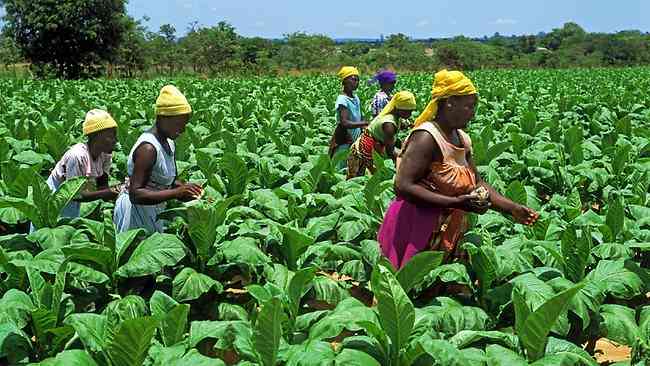
The farming town of Karoi, Mashonaland West province, will soon be a hive of activity as the tobacco selling season kick-starts.
Boasting over 15 registered auction floors, it has not been spared from an influx of local businesses.
From mobile food sellers to commercial sex workers migrating to the small town, the tobacco selling season is highly anticipated as it sustains livelihoods.
However, tobacco growers are battling to make ends meet.
Nothing tangible has changed to put a smile on their faces given the poor and unreliable rainfall patterns that affected crop production, resulting in poor quality tobacco and a huge decline in harvest.
For some tobacco players, this season they are not likely to be able to recoup losses made so far.
Tobacco players have raised alarm over the Reserve Bank of Zimbabwe (RBZ) foreign currency retention facility pegged at 25% in local currency that has been eroded by inflation.
The Zimbabwe Tobacco Growers Association (ZiToGA) in a statement highlighted the need for action to help struggling farmers so that the industry remains viable.
- Tobacco farmers cry foul
- Tobacco sales rake in US$574m
- We’re debt-trapped, lament tobacco farmers
- Tobacco exports rake in US$529m
Keep Reading
‘‘The issue of forex retention which was pegged at 75% forex and 25% local currency will negatively affect the profitability of the farming business to the ordinary growers as most if not all production costs are in United States dollars,” read part of the statement.
‘‘The 25% component will be eroded by the parallel market rate which is currently trading at $1:ZWL$20 000 almost double the official market rate. There is need for the government, Tobacco Industry Marketing Board (TIMB), growers’ associations and other stakeholders to act collectively for tobacco growers to benefit from their hard work.
‘‘To make it worse, merchants during the marketing season offer growers manipulatively low prices on their high-quality tobacco. They are not worried about the welfare and financial empowerment of the key producers but mainly focus on making huge profits and self- enrichment.
‘‘The system also compromises the independence of the growers, stripping them of their powers to choose a market of their choice.’’
Most of the farmers are under the contract system that has been abused.
‘‘The tobacco farming contract system in Zimbabwe has failed to totally empower tobacco growers to be independent, it has created farmers who rely on credit not viewing farming as a business. The farmers are disguised as workers for the contracting companies.
“The contract system, if not strictly monitored takes advantage of growers and turns them into ‘slaves’’ due to challenges and disadvantages that farmers cannot escape due to lack options and opportunities. Growers are always in credit, owing contracting companies huge sums of money that they cannot repay as companies charge exorbitant interest rates on their inputs straining the farmer who spends more than six months working on the crop,” ZiToGA said.
It recommended that the government comes up with monitoring mechanisms for contracting companies to adhere to regulations and industry expectations to protect the growers from exploitation.
‘‘The government must come up with State-controlled interests-free loan input schemes specifically for tobacco growers just like what is being done in the cotton sector where the government is supporting cotton growers through giving them inputs.
‘‘Ministry of Finance and RBZ must revise the forex retention ratio considering the real financial situation on the ground in our country to make sure that the farming business is profitable to our farmers. As an association we have a deep-rooted conviction that if all crucial players in the tobacco industry put their heads together, we can empower the growers, change their lives, make sure they benefit from their farming businesses and contribute to the growth of the industry to benefit from tobacco production,’’ the statement read.
TIMB spokesperson Chelesani Tsarwe said the organisation was spearheading a coal facility for farmers to use during curing of the golden leaf.
‘‘We have partnered Hwange Colliery to provide coal to tobacco farmers and it was launched in October 2023. So far, 6 000 tonnes of coal have been distributed to bona fide tobacco growers. The objective of this programme is to reduce the costs of tobacco production. Similar interventions are underway,’’ she said.
Tsarwe added that TIMB was working with AFC Bank to insure the tobacco crop.
‘‘Improvement of access to insurances by small-scale tobacco farmers is in line with the government goal on financial inclusion. So far 6 500 small-scale farmers were insured in the 2023/24 season through this facility covering floor to field risk that include hail and wind damages to the crop,’’ she added.
In a move aimed at improving viability of the tobacco sector, TIMB through the business department is working with farmers around the tobacco producing areas.
“In Mashonaland West there is a centralised production initiative involving 28 small-scale tobacco farmers to upscale operations into a formalised commercial enterprise. They have established a thriving 40-hectare tobacco project of which 75% is under irrigation. It is a high impact project which ties with the aspirations of the sector for value chain transformation and agriculture recovery plans and National Development Strategy 1 as well as Vision 2030 that aims for an improved economy,’’ she said.
According to Tsarwe, TIMB has played its role on farmers’ payment without prejudice.
‘‘As a board we stand guided by RBZ on tobacco payments. To map the way forward, growers can collectively through associations or unions, formally table their requests to relevant authorities for the review of the retention threshold,’’ Tsarwe said.
In written responses, RBZ spokesperson Kumbulani Shirichena said: “Let us wait for the upcoming monitory policy statement.”
Tobacco is one of the country’s largest foreign currency earners, raking in about US$1 billion annually.
But for the farmer, it is a seasonal pain due to poor payments which has left them in abject poverty.










